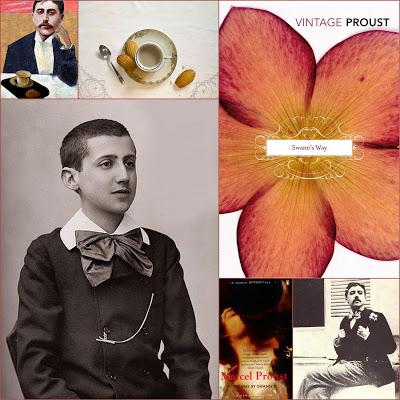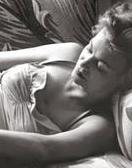
It seems rather presumptuous of me to write about Proust’s Swann’s Way in a few paragraphs when it takes him four pages to describe waiting for his mother’s goodnight kiss. Or, the lushness of the hawthorn blossoms. Or, the shades of color found in a bunch of asparagus, or the way the afternoon sunlight cast its gaze upon his Aunt Leonie’s lemon wood furniture. But all of this was in the first part of this novel, entitled Combray. For that is when he reminisces about being a child, leaving Paris for the country, and describes for us in such great detail the peaceful way of life he encounters there that it makes me remember a similar simplicity from my own youth.
How well I remember trying to find hiding places in which to read:
"But my grandmother, even if the weather, after growing too hot, had broken, and a storm, or just a shower, had burst over us, would come up and beg me to go outside. And as I did not wish to leave off my book, I would go on with it in the garden, under the chestnut-tree, in a little sentry-box of canvas and matting. In the farthest recesses of which I used to sit and feel that I was hidden from the eyes of anyone who might be coming to call upon my family."Or picnics my mother had prepared for us:
"It was time for us to feed. Before starting homewards we would sit for a long time there, eating fruit and bread and chocolate, on the grass over which came to our ears, horizontal, faint but solid still and metallic, the sound of the bells of Saint-Hillaire, which had melted not at all in the atmosphere it was so well accustomed to traverse, but broken piecemeal by the successive palpitation of all their sonorous strokes, throbbed as it brushed the flowers at our feet."
Rather abruptly, as Combray ends, we then find ourselves immersed in Swann in Love, which details Swann’s relationship with Odette. She is neither bright nor sophisticated; she does not even attract him very much at all when they first meet at the banal gatherings of the ‘faithful’ held in the Verdurin’s home. What is it, then, that makes Swann fall in love with her? The possibility that she might not be there, of course, and missing her one evening when he actually arrives and she is gone.
"As a matter of fact, she had never given him a thought. And such moments as these, in which she forgot Swann's very existence, were of more value to Odette, did more to attach him to her, than all her infidelities. For in this way Swann was kept in that state of painful agitation which had once before been effective in making his interest blossom into love, on the night when he had failed to find Odette at the Verdurins' and had hunted for her all evening. And he did not have (as I had, afterwards, at Combray in my childhood) happy days in which to forget the suffering that would return with the night."How tragic it was, to me, to learn that though he longed "to escape not so much from the keenness of his sufferings as from the monotony of his struggle" concerning Odette, he did in fact make her his wife. We discover this unhappy fact in the final portion of the book, which comes back to our young narrator and the affection he feels for Swann's daughter, Gilberte. It is, perhaps like her mother's lack of affection for Swann, a one-sided relationship. All the times that he plans to meet her at the park, hoping that she will arrive when he is there, or saving a special marble which reminds him of her eyes, are for naught. She cares for him with nothing more than a simple friendship.
Proust ends his first volume of the Remembrance of Things Past with rather melancholy thoughts, ones which often echo my own. It is easy for us romantics to look at the past as if it was better than the present. Perhaps it was. Perhaps it isn't. Regardless, we cannot go back. We can remember with great fondness the days of our youth, accompanied by our hopes. But we must bravely face the future, for those days gone by are only the thinnest slice of our long lives.
"The reality that I had known no longer existed. It sufficed that Mme Swann did not appear, in the same attire and at the same moment, for the whole avenue to be altered. The places that we have known belong not only to the little world of space on which we map them for our own convenience. None of them was ever more than a thin slice, held between the continuous impressions that composed our life at that time, remembrance of a particular image is but regret for a particular moment; and houses, roads, avenues are as fugitive alas! as the years."Proust’s recollections cause me to reflect on my own life in the same manner, and I found myself slowing down my thoughts to match the pace of his narrator.
It was a lovely feeling.
(Inspired to read with Arti of Ripple Effects at her suggestion; her latest post is here.)

